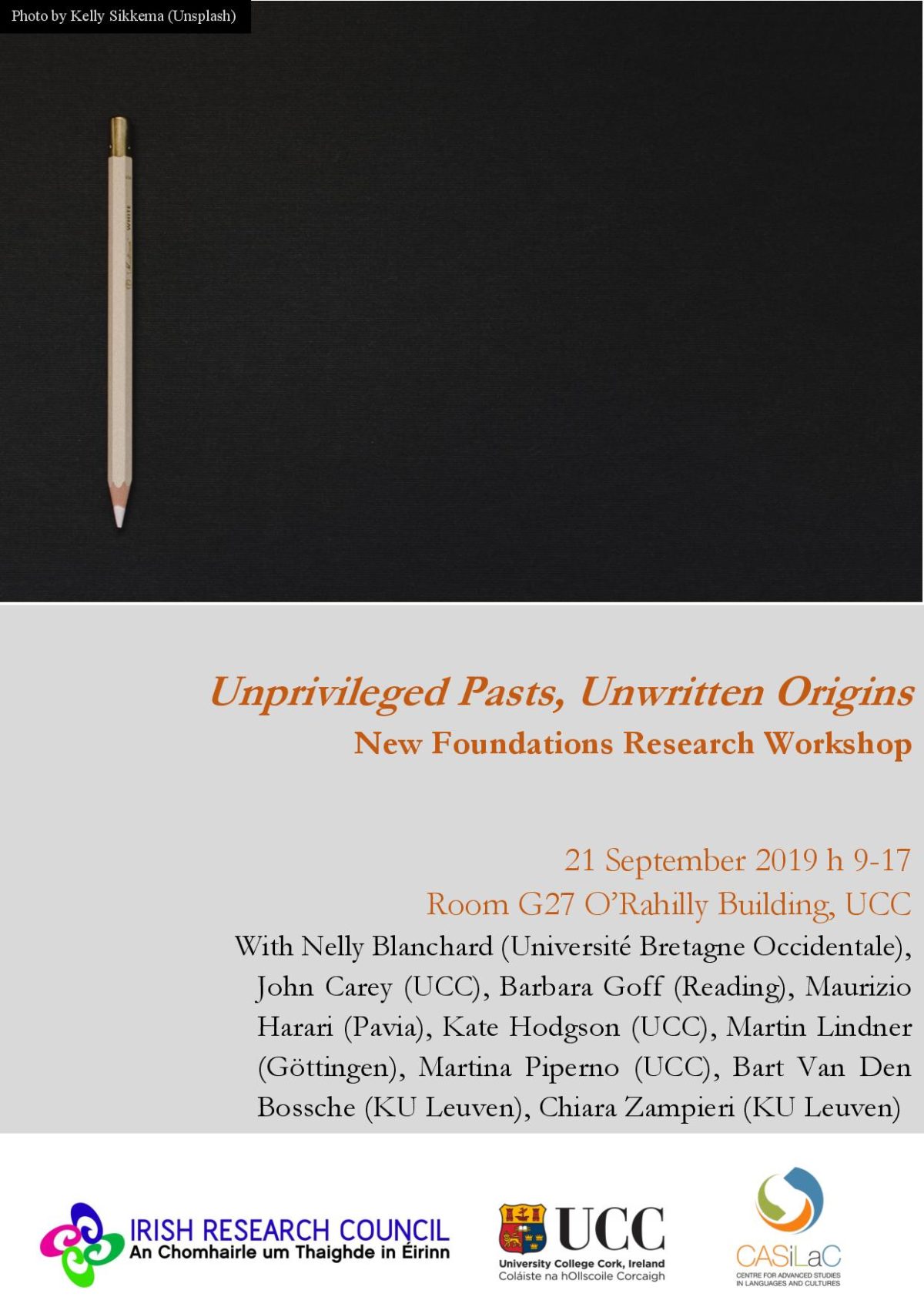Unprivileged pasts, unwritten origins
Research Workshop
The event is funded by the Irish Research Council through a New Foundations Grant and is the final outcome of the project RoOTS: Research on Origins, Traditions and Survival (PI Martina Piperno).
21 September 2019, Room G27 O’Rahilly Building, UCC
How do we moderns conceptualize the “roots” and the “beginning” of our collective identities? How have the traditions and habits we recognize as ours been shaped in time? How do lost ancient peoples, civilizations, and myths survive in modern imagination? In an era of re-emergence of populisms, increase in hate speech, and resurgence of xenophobia, reflecting on how political, social and personal identities are shaped by our perception of the past is crucial. The reception and re-use of image of the ancient in modern literatures, film, historiography and scholarship can take different forms. However, these are often studied within the boundaries of the discipline of Classical Reception. Despite the wide remit of this discipline, the reception of ‘Classics’ in the widest sense of the term has mostly to do with the transmission of texts. The notion itself of ’Classical reception’ does not always suffice to describe the reception of ancient histories, myths, images, figures: it follows that this notion is sometimes inadequate and a new framework including the reception of primitive, archaic, uncanny, mute, more problematic legacies is necessary. In order to develop new paradigms for understanding the reception of ancient histories, symbols, and myth, and to define how these uncategorized forms of “ancient” legacies survive in modernity, cultural historians with diverse backgrounds interested in how modernity has interrogated other ‘subaltern’ antiquities: more ‘local’ – as opposed to the alleged ‘universality’ of the Classical heritage – and more mysterious – since they left little or no trace of themselves as opposed to the model of the so-called ‘Classical tradition’.
9.00 Welcome coffee and registration
Panel 1: Delving in Darkness
Chair: Dr Clare O’Halloran
9.30: Prof. John Carey (University College Cork): The Nature of the Fomoiri: Imagining the Dark Other in Medieval Ireland
10.00: Prof. Barbara Goff (University of Reading): Touching in the Dark: ‘natives’ and ‘barbarians’ in the classicising fiction of Naomi Mitchison
10.30: Discussion
11.00-11.30: break
Panel 2: Choosing your ancestors
Chair: [TBC]
11.30 Prof. Nelly Blanchard (Université de la Bretagne Occidentale): The benefits of the Celtic ancestors. From the Celtomanes to the present-day Breton business-model
12.00: Dr Martin Lindner (Universität Göttingen): ‘Ex septentrione lux’ – Nordic High-Culture Narratives in German Documentary Films from the 1930s
12.30: Dr Kate Hodgson (University College Cork): Memory and the ‘children of Anacaona’: Indigenous Caribbean traces in Haitian writing
13.00: Discussion
13.30-14.30: lunch
Panel 3: Etruscan places
Chair: Dr Daragh O’Connell
14.30: Prof. Maurizio Harari (Università di Pavia):The Etruscans. A myth of the twentieth century between literature and movies.
15.00: Prof. Bart Van Den Bossche / Dott. Chiara Zampieri (Katholieke Universiteit Leuven): Etruscan myths in early twentieth-century Britain
15.30: Coffee break
15.45: Dr Martina Piperno (University College Cork): The malleability of the Pre-Roman past: challenges, imagination, risks
16.15: Discussion and final remarks

